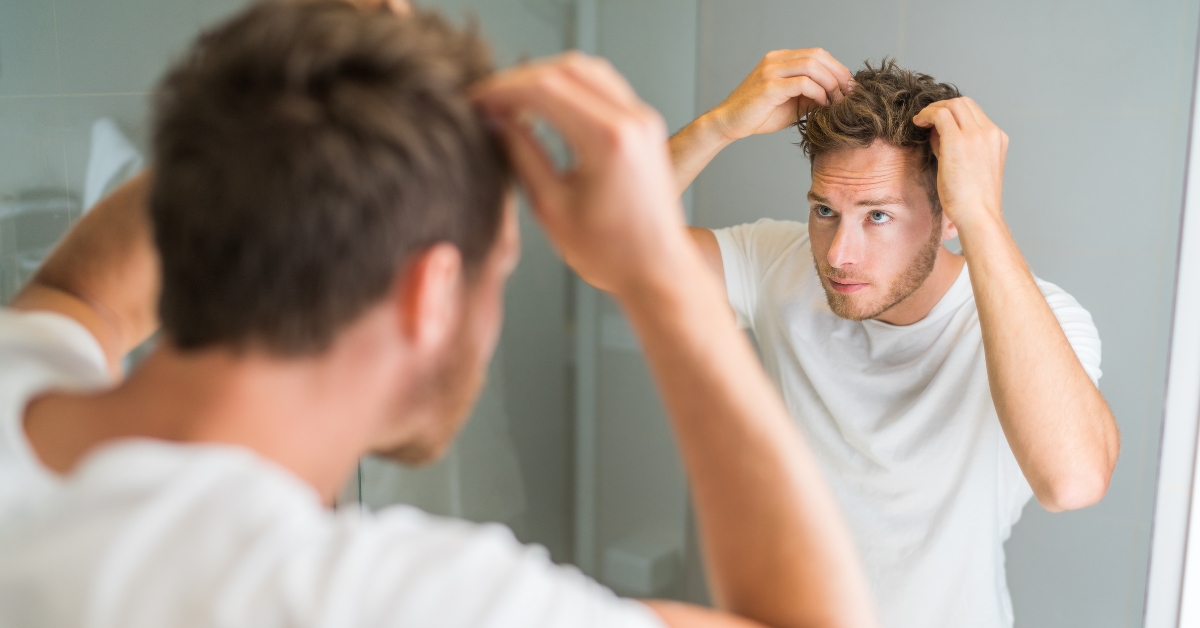The topic of testosterone replacement therapy (TRT) often raises many questions and concerns, one of the most frequent being, “Does testosterone cause hair loss?” If you’re considering TRT or already undergoing this treatment, you’ve likely wondered how it could affect your luscious locks.
In this comprehensive blog post, we’ll delve into the science and studies behind TRT and its potential effects on your hair so you can make an informed decision about your health and appearance.
What is TRT and Why Do People Take It?
Testosterone Replacement Therapy (TRT) is a medical treatment designed to address low testosterone levels, a condition that can affect men and, in some cases, women. Low testosterone levels can significantly negatively impact one’s life, including fatigue, low sex drive, decreased muscle mass, and mood swings. Addressing these symptoms and seeking appropriate medical attention is crucial to prevent further complications and improve overall quality of life. By administering synthetic testosterone through various treatment options, like injections, gels, or patches, TRT aims to restore hormonal balance and help individuals regain a sense of well-being.
Why TRT May Cause Hair Loss
One of the most pressing questions surrounding Testosterone Replacement Therapy (TRT) is its potential impact on hair loss. Let’s delve deeper into the root causes of hair loss in TRT.
The Role of Testosterone and DHT in Hair Loss
Testosterone is crucial for men as it supports various bodily functions. Still, it can also convert into DHT through an enzymatic process. DHT binds to receptors in the scalp’s hair follicles, potentially causing them to shrink over time. This miniaturization of hair follicles can lead to adverse effects, like hair thinning, recessive hairlines, bald spots, full-blown cases of male pattern baldness, and hair loss. While not everyone who undergoes Testosterone Replacement Therapy (TRT) will experience this side effect, understanding the role that both testosterone and DHT play in hair loss can equip you with the knowledge to manage expectations and explore preventative measures.
Scientific Studies and Evidence
Various studies have examined the relationship between Testosterone Replacement Therapy (TRT) and hair loss, with mixed results. Some research suggests a definitive link between increased DHT levels and male-pattern baldness. At the same time, other studies indicate that genetic predisposition plays a more crucial role.
Not all individuals undergoing TRT experience hair loss, suggesting that other factors, such as age, overall health, and genetics, may also contribute. Thus, while evidence indicates that TRT can exacerbate a decline in hair growth for those already genetically predisposed, it’s far from a foregone conclusion for everyone.
Strategies for Mitigating the Risk of Hair Loss While on TRT
If the question “Does testosterone cause hair loss?” has you concerned, but you don’t want to forego the beneficial effects of Testosterone Replacement Therapy (TRT), there are several strategies you can employ to mitigate the risk of hair thinning or loss.
Consult Your Healthcare Provider
Before starting TRT, have an in-depth discussion with your healthcare provider about your concerns regarding hair loss. They can guide you through your options and may adjust your testosterone treatment accordingly.
Consider DHT Blockers
Oral finasteride or dutasteride can prevent testosterone from converting to DHT, which protects hair follicles from miniaturization.
Use Topical Treatments
Minoxidil is a topical solution commonly used to combat hair loss. While it doesn’t interfere with DHT, it can stimulate scalp hair growth and could be a supplemental strategy.
Practice Healthy Scalp Routine
Keeping your scalp clean and well-nourished can also contribute to healthier hair. When searching for hair care products, consider selecting shampoos and conditioners formulated to address and prevent excessive hair loss.
Undergo Genetic Testing
Genetic testing can reveal if you’re predisposed to male-pattern baldness if you’re seriously concerned, helping you gauge your potential risk better.
Do Regular Check-ups
You must maintain regular check-ups with your healthcare provider to assess the efficacy of your treatment and promptly make adjustments to mitigate potential side effects, including advanced hair loss.
Why is it Important to Consult with a Licensed Medical Professional Before Undergoing TRT?
Before embarking on a journey with Testosterone Replacement Therapy (TRT), it’s essential to consult with a licensed medical professional. Addressing concerns like “Does testosterone cause hair loss?” is only one aspect of the whole picture.
A qualified healthcare provider can provide a thorough evaluation of your hormonal levels, discuss your medical history, and assess any other risk factors you may have. They can tailor a TRT regimen specifically for you, including monitoring DHT levels and recommending preventative measures for hair loss.
Your healthcare provider can also guide you through any potential therapy side effects and complications, ensuring you proceed with full knowledge and confidence. Consulting a medical professional is crucial for safe and effective TRT.
Takeaway
Navigating the complex landscape of Testosterone Replacement Therapy (TRT) can be daunting, especially when you’re confronted with concerning questions like, “Does testosterone cause hair loss?” While TRT offers numerous benefits, it’s essential to approach it with a comprehensive understanding of its potential effects on your body, including your hair.
If you’re contemplating TRT or have concerns about its potential side effects, let Best TRT guide you. Our online platform provides comprehensive information, expert consultations, and support tailored to your needs. Don’t let uncertainties hold you back; empower yourself with Best TRT and make choices with clarity and confidence.
Schedule Your Free TRT Consultation Here


